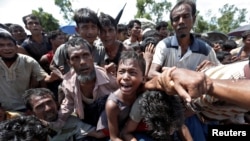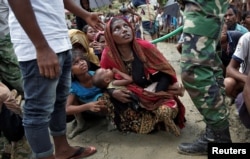U.S. and Bangladeshi officials will meet in Washington for talks this week focusing on regional security challenges, with the South Asian country dealing with an influx of Rohingya fleeing violence in Myanmar
Deputy U.S. Assistant Secretary of State for Political-Military Affairs Michael Miller and Bangladesh Director General for the Americas at the Ministry of Foreign Affairs Abida Islam will chair the talks that begin October 3. U.S. Ambassador to Bangladesh Marcia Bernicat will also take part.
"Discussions will focus on regional security challenges as well as on efforts to expand partnerships in humanitarian assistance and disaster relief, peacekeeping, defense trade, military cooperation, and counterterrorism, as well as maritime security and territorial defense," the U.S Embassy in Dhaka said in a statement.
US aid
The State Department recently announced the U.S. was set to contribute $32 million worth of humanitarian aid to help the Rohingya Muslims fleeing Myanmar's Rakhine state. U.S. officials say of the $32 million, $28 million would go to Bangladesh, the rest to Myanmar.
The U.S. aid package — the first major response from the Trump administration to the situation — will include food, medical supplies, water, emergency shelter and other support.
Simon Henshaw, acting assistant secretary of state for population, refugees and migration, thanked the Bangladeshi government and people for their "warm response and their strong response" in supporting the Rohingya who have come across the border.
Over the past month, more than 400,000 Rohingya Muslims have fled Myanmar, where they face human rights violations and discrimination.
Rohingya militants attacked Myanmar security forces in late August. Since then, analysts and rights workers say, the military has carried out a brutal crackdown, burning villages and killing women and children as they fled.
Myanmar’s civilian leader, Aung San Suu Kyi has condemned the human rights violations taking place in her country's western Rakhine state, but she has come under strong international criticism for not speaking out more forcefully on the situation.
VOA’s Cindy Saine contributed to this report.







